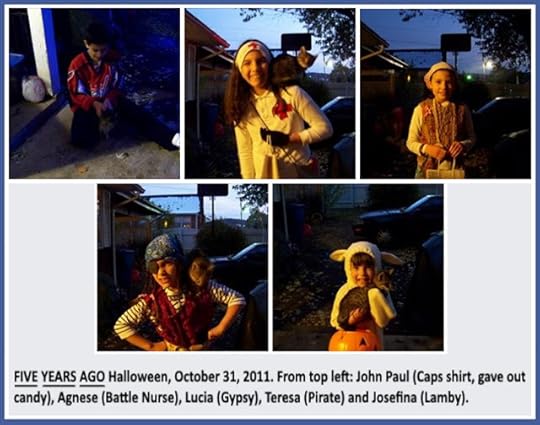John Janaro's Blog, page 224
November 14, 2016
Suffering With Us
 "Man is worth so much to God that he himself became man in order to suffer with man in an utterly real way—in flesh and blood—as is revealed to us in the account of Jesus's Passion. Hence in all human suffering we are joined by one who experiences and carries that suffering with us; hence con-solatio is present in all suffering, the consolation of God's compassionate love"
"Man is worth so much to God that he himself became man in order to suffer with man in an utterly real way—in flesh and blood—as is revealed to us in the account of Jesus's Passion. Hence in all human suffering we are joined by one who experiences and carries that suffering with us; hence con-solatio is present in all suffering, the consolation of God's compassionate love"(Benedict XVI, encyclical Spe Salvi, 39).
Published on November 14, 2016 20:00
November 12, 2016
Our Salvation Comes From Hope
 Pope Francis made a point in a recent homily that is worth remembering as we try to discern our priorities. Our salvation is not gained through external spectacles. It is not found in following the latest trend, being among the 'in' crowd or on the latest winning team, or going from one superficial distraction to another. He uses the image of 'fireworks,' but we could just as easily speak about making money, winning the argument, becoming a celebrity, or gaining power.
Pope Francis made a point in a recent homily that is worth remembering as we try to discern our priorities. Our salvation is not gained through external spectacles. It is not found in following the latest trend, being among the 'in' crowd or on the latest winning team, or going from one superficial distraction to another. He uses the image of 'fireworks,' but we could just as easily speak about making money, winning the argument, becoming a celebrity, or gaining power.As Christians we do not place our hope in these things. Nor do we lose our hope when our earthly expectations are not realized, when we have to deal with fears or dangers, nor (above all) when we face the apparently uninteresting and unexciting moments of almost all of our days.
This is not to deny the range of our human joys and sorrows, but to put them in perspective, and to remember that we attain the fulfillment for which we were created by patience, endurance, and perseverance on the road toward God, the road of hope.
"The Kingdom of God is not a 'show' religion: one that is always seeking new things, revelations, messages. God spoke through Jesus Christ: this is the last Word of God. The ['show' religion] is like fireworks that lit you up for a moment and then what is left behind? Nothing. There is no growth, there is no light, there’s nothing: just an instant. And we have been tempted many times by this 'entertainment religion' of seeking things that are extraneous to revelation, to the meekness of the Kingdom of God that is among us and which grows. For this is not about hope, this is about the desire to have something in our hands. Our salvation comes from hope, the hope of a man who sows the seed or the woman who makes the bread, mixing yeast and flour: a hope that grows. Instead, this artificial brightness only lasts an instant and then it dies away, like fireworks: they are not needed for giving light to a house. It’s just a show" (Pope Francis, Homily of November 10, 2016).
Published on November 12, 2016 13:58
November 10, 2016
Meeting With One Another
Published on November 10, 2016 20:26
November 8, 2016
Beyond Election Day: Learning the Way of "Solidarity"
 It is Election Day for President in the United States of America. Regardless of who they are voting for, many Americans have low expectations, if not outright fears and disgust, for both major party candidates. We are tempted to regard the next four years with a helpless and morbid cynicism. But we must remember that our political responsibility does not end when we leave the voting booth.
It is Election Day for President in the United States of America. Regardless of who they are voting for, many Americans have low expectations, if not outright fears and disgust, for both major party candidates. We are tempted to regard the next four years with a helpless and morbid cynicism. But we must remember that our political responsibility does not end when we leave the voting booth.We have a commitment to upholding the dignity of every human person over the whole course of life from conception to natural death. We must be active in building up our families, communities, local institutions and environment, and all that has been immediately entrusted to us. At the same time, we must not close in upon ourselves into tightly sealed bubbles of fear. With due regard to the legitimate needs of safety and order, we must also cultivate the magnanimous habit of hospitality. We want to build our own communal places with such strength, confidence, and generosity that we are free to welcome others--especially those among our brothers and sisters who are most desperately in need.
We may also want to take up new initiatives and begin to take steps that could lead to changes in the dysfunctional political culture that has brought us to the awful impasse of the 2016 election year circus.
Above all, we need a new cultivation of political virtue in America, in a way that will enable us to judge and act more effectively for the good in our own society and in our relationships with peoples and nations in the rest of the world.

Nearly thirty years ago, Pope Saint John Paul II gave us some very specific magisterial teaching that remains vital and relevant today. He stressed the particular virtue that we need if we are to be political protagonists in the third millennium--the virtue that is essential for an interdependent world in possession of historically unprecedented kinds of technological power.
The great Pope called this virtue "Solidarity."
To cultivate this virtue and allow it to change our way of thinking and relating to one another is a special political task that me and my countrymen need to take up anew in this time, regardless of who becomes President after today. We must have the courage to enlarge our horizons and recognize the responsibilities that correspond to the power and wealth that have been entrusted to us. We need to recognize that the interdependence of our world is a human reality--an interdependence of human persons--that has implications for our lives. These implications, these human realities cannot be dominated, controlled, or suppressed by our power. Neither can they be ignored or pushed away as insignificant. They are real human needs that cry out to us, problems of people in our own communities, our nation, and the world that are inseparably connected to our own needs and problems. They must be lived and judged in varying circumstances with realism, proper criteria, wisdom, generosity, and love.
The United States of America will not be able to grow and mature further as a nation in the 21st century unless we learn the way of solidarity, unless we learn to practice the virtue of solidarity.
Saint John Paul II says it much better in the excerpts below. His words, though not always easy to understand, are worth the labor of our prayerful reading, study, and consideration. I dare say, we ignore him and his successors at our own peril, and the world's peril.
It is above all a question of interdependence, sensed as a system determining relationships in the contemporary world, in its economic, cultural, political and religious elements, and accepted as a moral category. When interdependence becomes recognized in this way, the correlative response as a moral and social attitude, as a "virtue," is solidarity.
This is not a feeling of vague compassion or shallow distress at the misfortunes of so many people, both near and far. On the contrary, it is a firm and persevering determination to commit oneself to the common good; that is to say to the good of all and of each individual, because we are all really responsible for all.
[The political forces of domination that degrade the human person for profit or power] are only conquered--presupposing the help of divine grace--by a diametrically opposed attitude: a commitment to the good of one's neighbor with the readiness, in the gospel sense, to "lose oneself" for the sake of the other instead of exploiting him, and to "serve him" instead of oppressing him for one's own advantage (cf. Mt 10:40-42; 20:25; Mk 10:42-45; Lk 22:25-27).
The exercise of solidarity within each society is valid when its members recognize one another as persons. Those who are more influential, because they have a greater share of goods and common services, should feel responsible for the weaker and be ready to share with them all they possess.
Those who are weaker, for their part, in the same spirit of solidarity, should not adopt a purely passive attitude or one that is destructive of the social fabric, but, while claiming their legitimate rights, should do what they can for the good of all. The intermediate groups, in their turn, should not selfishly insist on their particular interests, but respect the interests of others....
The same criterion is applied by analogy in international relationships. Interdependence must be transformed into solidarity, based upon the principle that the goods of creation are meant for all. That which human industry produces through the processing of raw materials, with the contribution of work, must serve equally for the good of all....
Surmounting every type of imperialism and determination to preserve their own hegemony, the stronger and richer nations must have a sense of moral responsibility for the other nations, so that a real international system may be established which will rest on the foundation of the equality of all peoples and on the necessary respect for their legitimate differences.
The economically weaker countries, or those still at subsistence level, must be enabled, with the assistance of other peoples and of the international community, to make a contribution of their own to the common good with their treasures of humanity and culture, which otherwise would be lost for ever.
Solidarity helps us to see the "other"-- whether a person, people or nation -- not just as some kind of instrument, with a work capacity and physical strength to be exploited at low cost and then discarded when no longer useful, but as our "neighbor," a "helper" (cf. Gen 2:18-20), to be made a sharer, on a par with ourselves, in the banquet of life to which all are equally invited by God. Hence the importance of reawakening the religious awareness of individuals and peoples. Thus the exploitation, oppression and annihilation of others are excluded....
The goal of peace, so desired by everyone, will certainly be achieved through the putting into effect of social and international justice, but also through the practice of the virtues which favor togetherness, and which teach us to live in unity, so as to build in unity, by giving and receiving, a new society and a better world.
~Pope Saint John Paul II, Encyclical Solicitudo Rei Socialis 39, 40.
Published on November 08, 2016 12:25
November 6, 2016
Minds On Fire
"It's not fire on the rooftops that threatens us. It's fire in the minds of men" (Dostoevsky, The Possessed).


Published on November 06, 2016 13:30
November 4, 2016
Love and the Road of Sorrow and Hope
 God has revealed His love for us. God is Love.
God has revealed His love for us. God is Love.God has revealed that Love is His infinite glory, His infinite mystery. But after 20 centuries of Christianity, the words "God is Love" can sound merely sentimental. They are repeated in an effort to make us feel accepted and "safe" -- but often at the price of ceasing to have any clear significance.
We need love, but we are also afraid of real love, because real love changes us and takes us beyond what we already know. We are thus afraid of love, but still we cannot even imagine living without it. So we invent half-hearted substitutes, resemblances of love that are facile and shallow, that don't really respond to our solitude but merely distract us, for a time, from our loneliness.
Therefore we want "love" to remain trivial, but in this way we make God trivial too. We consign Him to the superficial places, to the margins of life. We keep His love at a distance, as though it were some vague comforting story.
We do not want to think about real love, because it is so fundamental and mysterious, because it encompasses sacrifice, and because our human experience of real love is so often one of failure, limitations, and disappointment.
And even when we truly give ourselves in love, when we brave its risks and fight its battles, when we do all the hard work investing ourselves, moving beyond ourselves, building a relationship that changes us and renews us--even then love seems to be, at the end, a long road to sorrow.
We love someone, and then they die.
How can we bear this? Where is the person we have loved so truly and so much? Death is the final "unknown" in a relationship, where we are not only blind but also unable to find any footing in front of us that would allow us to remain with one we love.
We have "lost" them.
We look to our ideas and imagination, our understanding of religious teaching, our intuitions, our wishful thinking. They must be somewhere, resting in peace. Perhaps we envision a hazy "afterlife," strange and inaccessible, or else we allow them to attain some higher purpose by merging with the universe or disappearing into a kind of supercosmic nirvana. All this may bring some measure of solace and acceptance.
But does it satisfy us? Is it enough, for real love? Or does it still leave us without hope on the road of our own loneliness?
How can we ever have hope again? In life we knew a human person, someone we could walk with, with real feet firmly meeting the ground beside us. Here is our great sorrow: we want to walk again with the person we love. We want to see two pairs of feet, and instead we only see one. We walk alone.
And then, a stranger appears on the road to sorrow. Or, rather, we begin to notice the stranger who walks hidden and silently here, always going on ahead, to the vanishing point of all our loves, and beyond them.
He walks with us. We don't know who the stranger is, but hope is awakened within our hearts. The stranger is human, and hope discovers in his face a glimpse of all the ones we have loved.
Are we willing to follow that hope, and take the stranger into the home of our hearts? Or will we let him pass by?
Only if we let the stranger in will he open our eyes. He will show us that he has all the deep wounds of our sorrows. He has them.
But there is no easy way to learn this. We have to let the stranger in. We have to let Him show us His humanity and let the fire of hope burn in us.
Published on November 04, 2016 11:00
November 3, 2016
We Depend on One Another
 With the U.S. Presidential election less than a week away, tensions continue to rise, and Americans have dire forebodings about the future regardless of who wins. Meanwhile, the news from all over the world is dominated by a desperate litany of violence and intractable problems. The year of 2016 seems like one long dystopian nightmare. Will anything good come out of all this mess?
With the U.S. Presidential election less than a week away, tensions continue to rise, and Americans have dire forebodings about the future regardless of who wins. Meanwhile, the news from all over the world is dominated by a desperate litany of violence and intractable problems. The year of 2016 seems like one long dystopian nightmare. Will anything good come out of all this mess?Perhaps we are going to learn in a more immediate way how much we all really do depend on one another.
The "human family" is not a cozy, tame little idea. If someone hurts, we all hurt. It's not really true that 2016 marks some radical departure from normal human experience. In fact, the human family always shares a profound bond of suffering. We all share a common affliction.
We also share a common hope.
We share a source of unity that is greater than everything that divides us -- greater than every fear.
In the days to come, we would do well to pray and "fast" -- i.e. voluntarily embrace some sacrifices within our daily routine -- so that we might remember our common suffering, our existential poverty, our dependence on God, and the mysterious bond that unites us in our journey to Him and sustains us in a posture of compassion for one another.
We must beg the Lord to change our mentality and transform our way of looking at the world and all of the problems and the dangers, and all the evil that has already been judged and vanquished.
Published on November 03, 2016 20:33
November 1, 2016
All Saints
Published on November 01, 2016 20:51
October 31, 2016
All Hallows Eve Nostalgia
After seeing all these pictures of cute little kids dressed up and going out for candy, I got a bit nostalgic. So I decided to look back, but not too far: just five years ago.
Here are the Janaro kids as they appeared on the night of October 31, 2011:

Here are the Janaro kids as they appeared on the night of October 31, 2011:

Published on October 31, 2016 20:23
October 30, 2016
Your Spirit is in All Things

"You have mercy on all, because you can do all things;
and you overlook people's sins that they may repent.
For you love all things that are
and loathe nothing that you have made;
for what you hated, you would not have fashioned.
And how could a thing remain, unless you willed it;
or be preserved, had it not been called forth by you?
But you spare all things, because they are yours,
O Lord and lover of souls,
for your imperishable spirit is in all things!
Therefore you rebuke offenders little by little,
warn them and remind them of the sins they are committing,
that they may abandon their wickedness and believe in you, O Lord!"
~Wisdom 11:23-12:2
Published on October 30, 2016 20:39





